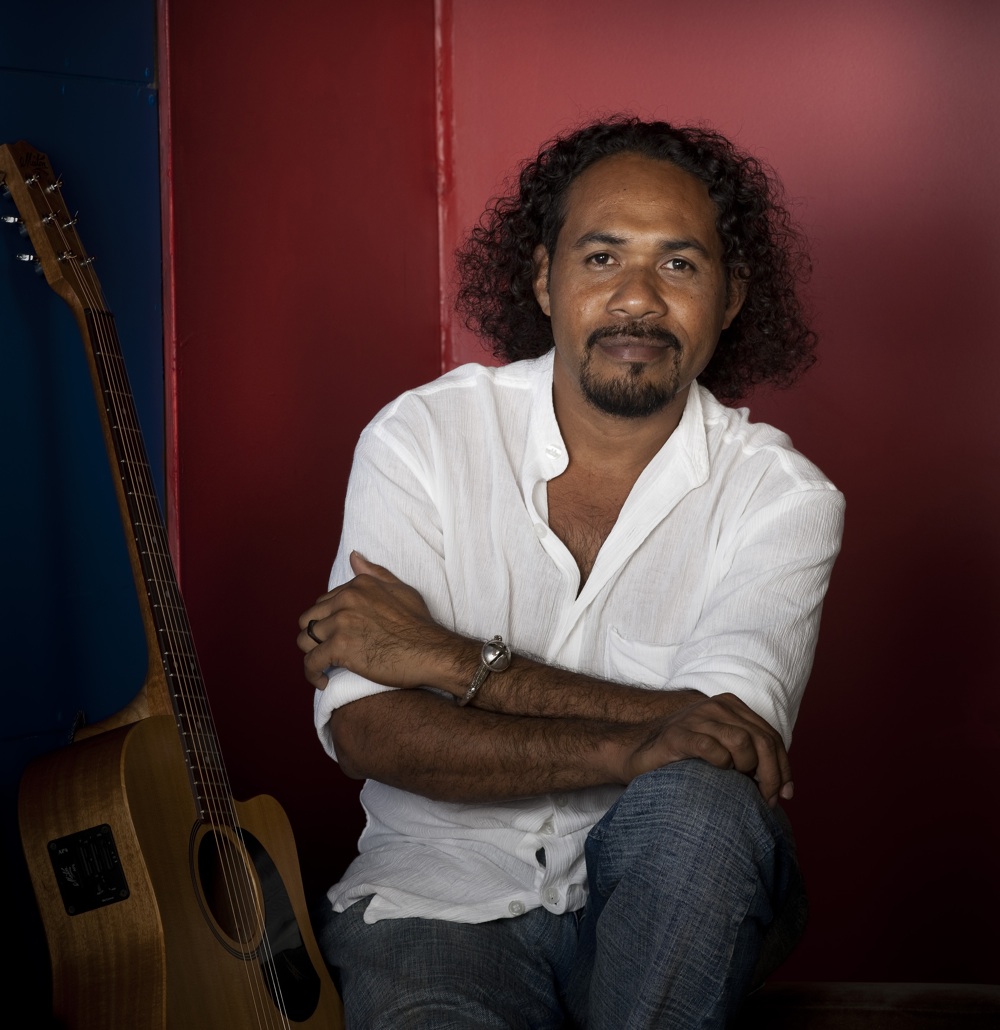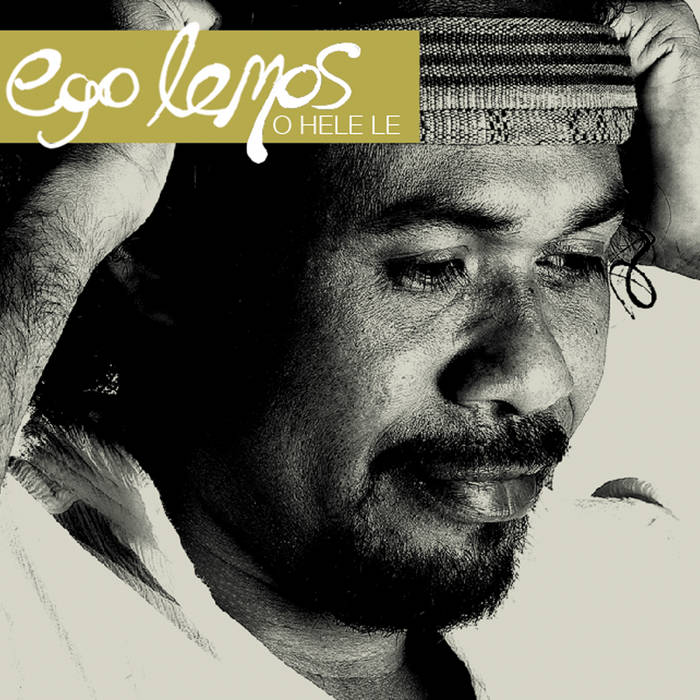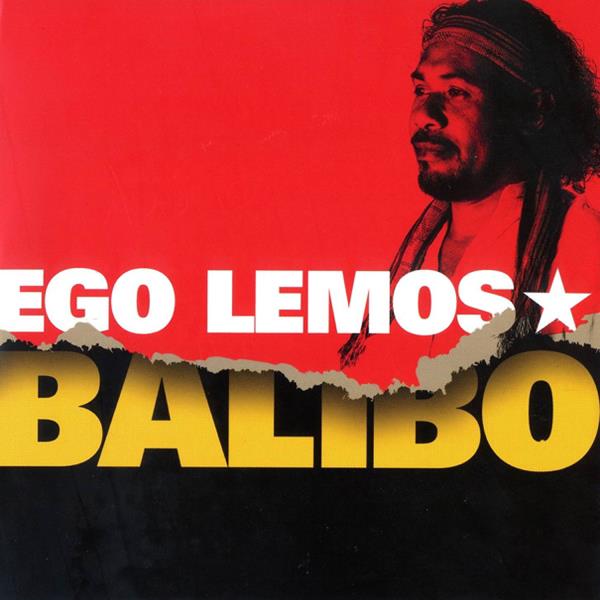
Ego Lemos
Musician, singer songwriter and environmental troubadour Ego Lemos is a remarkable man, with a remarkable voice in more ways than one.
Regarded as a significant East Timorese community member, Ego has lived through three tumultuous periods of his nation’s history – from the Portuguese colonial rule that lasted almost 500 years, through the Indonesian occupation, and into UN transition and Independence early this century. He was born in 1972, in the dying days of the Portuguese colonial administration, and as a baby fled the civil unrest following Portugal’s withdrawal, Fretilin’s declaration of Independence, and Indonesia’s invasion. Ego was taken with his mother and relatives to the rural forests of East Timor, where he survived with other families for three years without basic infrastructure. During this time, and the immediate period thereafter, when they were able to move back to the Capital, Dili, Ego lost his three siblings to disease and malnutrition, and his father and grandfather to the confusion of war.
Unlike so many young men his age, when East Timor gained its Independence after a bloody referendum in
1999, he was lucky to be alive. His activities had brought him close to death many times. Foreign helpers flooded into the country, and one of these, a permaculture trainer from Australia, would become Ego’s close friend and mentor. Having taught himself English from dictionaries, Ego became his mentor’s translator, travelling the country with him to give workshops, train farmers and instigate projects all over the country in
home gardening, nurseries and the concepts of sustainable agriculture. Soon, he outgrew his position as a simple translator, and Ego Lemos founded the country’s first Permaculture centre, Permatil, which he coordinated for five years. He also founded a highly successful sustainable agriculture network, HASATIL, both of which still flourish today.
Soon, Ego was being invited to international conferences to speak of his experiences, and share his thoughts on permaculture-based revitalisation in communities all over the world. He also carried his guitar and continued to sing his songs in his native language TETUM. In 2005 he was asked to address the UK parliament, and in 2006 performed at Australia’s national Indigenous Festival – the Dreaming Festival. It was at The Dreaming Festival where Rhoda Roberts [AD] introduced Geoffrey Gurrumul Yunupingu to Ego Lemos for the first time. Gurrumul was taken by the quality of Ego’s voice, melodies and energy.
“I watched Gurrumul tapping his fingers along to Ego’s rhythms and soaking up the vibe. Ego’s ability to move beyond language into pure music was evident, we both really loved his sound”, says Michael Hohnen.
Fast-forward to September 2009 and Ego Lemos’ debut album O Hele Le was produced by Michael Hohnen and Craig Pilkington.
Ego Lemos felt the power of music as a young boy when his mother would play the harmonica in the middle of the night to soothe her soul after the death of her husband and father due to the war in East Timor. His ability to poignantly express the collective trauma held by fellow East Timorese in a positive, infectious and melodic manner has already created a name for him as a musician both here in Australia and at home in East Timor where school children are perfectly singing his songs en masse in classrooms. Australian film director Robert Connolly [The Boys, The Bank, Three Dollars] asked Ego to write a song for his feature film Balibo starring Anthony La Paglia [Released Aug 2009]. It was after reading the book Cover-Up: the Story of the Balibo Five, by Jill Jolliffe that night and going to sleep with the young men firmly on his mind, Ego woke at 3am in morning and literally penned the haunting track simply called Balibo by 7am. “I was reading Jill’s book on the Balibo Five before I went to sleep and tapped into their psyche at the time, I could inexplicably feel exactly what these young men felt as their lives were about to be taken away”, says Lemos.
In November 2009, Ego Lemos won Best Original Song Composed for Screen at the 2009 APRA-AMCOS Screen Awards for ‘Balibo’. In front of Australia’s film and music industry, a wide-smiling Ego accepted this honour, his first major music award, presented by the Hon Peter Garrett AM MP, Minister for the Environment, Heritage & the Arts.
It has been over ten years that his voice as a songwriter, permaculturalist, and community development worker has been charming audiences around the world with his inspiring enthusiasm for environmental and social revitalisation in his home country, East Timor, and abroad. Due to his diplomatic manner, fairness, and political eloquence Ego’s voice travels far to many sectors and people.
The people of East Timorese are passive by nature and have a great love and appreciation for music and the
arts. Spokesperson for East Timor’s most popular contemporary band, Cinco do Oriente, Ego Lemos had interpreted and modernised some of the most beautiful and heart-wrenching traditional melodies from his nation’s history, and produced a wreath of original songs in the Nation’s lingua-franca, Tetum. He sings about issues such as the centrality of water to life, praises the nation’s peasant farmers in their unceasing toil, and urges his people to remain positive and strive for unity.
His debut solo album titled O Hele Le is a poignant, subliminally strong solo album for Ego Lemos and gradually penetrates the psyche where his voice remains for some time after. With this album of music Ego Lemos shows a great intimacy and connection with songwriting. It highlights the tremendous talent he has to offer Indigenous music in Australia, and indeed, the world.


